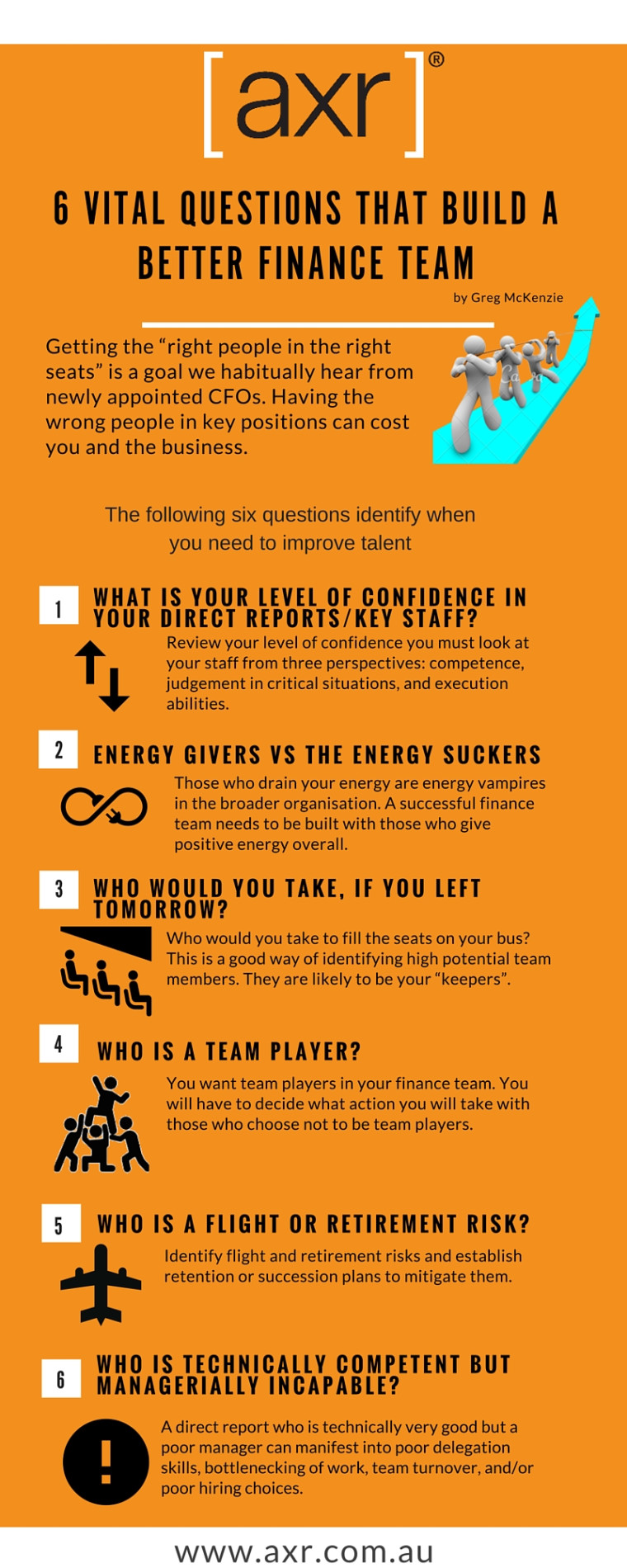by Greg McKenzie
From new to veteran CFOs, having the right team in place is essential for success.
CFOs resoundingly state that retaining top performers is worth the effort to build a strong finance function. Many believe that recruiting talent aligns the long-term needs and culture of the organisation. They encourage hiring not simply for technical skills, but also for mind-set, breadth, and partnering ability.
Obviously a tall order. While there are no simple answers when it comes to people, knowing fleeting trade-offs and how to effectively gauge skills, will help you navigate these decisions. Below we discuss six vital questions you need to ask now, to shape the team you need to achieve the priorities you’ve set.
Right people, right seats
Getting the “right people in the right seats” is a goal we habitually hear from newly appointed CFOs. Having the wrong people in key positions can cost you valuable time—your most precious resource—as you have to review and repair the damage.
If you are viewed as carrying, rather than addressing, the issue of non-performers in a timely way, it can also cost you credibility.
Accomplishing the “right people in the right seats” goal begins with gauging the capabilities of direct reports and other critical staff. After which, you decide to improve individual capabilities or recruit new talent.
You can evaluate performance reviews, which are often not sufficiently informative, or quiz a previous manager, if they remain with the organisation. But, typically, you need to make your own observations.
Aside from gut feel, the following six questions provide a quick snapshot of key staff members and their capabilities.
-
- What is your level of confidence in your direct reports and key staff below them? To review your level of confidence you must look at your staff from three perspectives: competence, judgment in critical situations, and execution abilities.
-
- Who are the energy givers and the energy suckers? Those who drain your energy are energy vampires in the broader organisation. A successful finance team needs to be built with those who give positive energy overall.
-
- Who would you take, if you left tomorrow? This is a good way of identifying high potential team members. They are likely to be your “keepers”.
-
- Who is a team player? You want team players in your finance team. You will have to decide what action you will take with those who choose not to be team players.
-
- Who is a flight or retirement risk? Identify flight and retirement risks and establish retention or succession plans to mitigate them.
-
- Who is technically competent but managerially incapable? A direct report who is technically very good but a poor manager can manifest into poor delegation skills, bottlenecking of work, team turnover, and/or poor hiring choices.
Taking action on talent
While there are other important questions, these six identify when you need to improve talent. From here, there are three options: replace problematic team members, reassign staff, or remediate performance gaps through training or coaching.
Ideally, you want high confidence levels in all direct reports. For reports you are unsure about, assign them key tasks to test competence and determine your confidence in them. For those reports you do not have confidence in, your likely best option is to replace or reassign them.
Need to replace or reassign underperforming direct reports?
Talk to us and arrange a consultation.
What do you think?
We would love to hear your thoughts! Feel free to comment on our LinkedIn or Twitter or register to receive it monthly via email.


